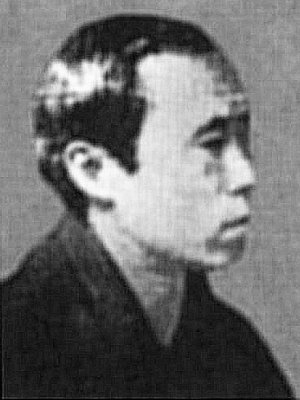| |
YOSHIIKUUtagawa YOSHIIKU
|
|
| |
||
Artist
– "OCHIAI Yoshi-iku" ("落合 芳幾"), generally known as
'YOSHIIKU' ('芳 幾', 1833 - 1904) was a Japanese woodblock artist
and a 4th generation Member of the Utagawa school as a pupil of
Kuniyoshi. YOSHIIKU was apprenticed to Kuniyoshi's studio at the
age of 16 in the end of 1849. Among his most notable school
mates were Kyōsai (暁斎), Yoshitora (芳虎 ), and Yoshitoshi (芳年). The
natural rivalry between the pupils in Kuniyoshi's studio,
particularly coming up in the same school, and competing for the
master's recognition was legendary, and even resulted in a
caricature, made by Kyosai (refer to Yoshitora's biography).
YOSHIIKU was six years Yoshitoshi's senior. And it is reported,
that he bullied him in school. Despite the life-long rivalry
between YOSHIIKU and Yoshitoshi, they later collaborated in the
late 1860ies on the production of several print series.
Throughout the next two decades, they often shared the same
writers and publishers.
YOSHIIKU's earliest known work dates to 1852 when he provided scenic backgrounds to some actor prints by Kuniyoshi. Like his master Kuniyoshi, YOSHIIKU designed a wide range of prints including those depicting bijin-e (beautiful women), musha-e (warriors), yakusha-e (actors). Especially after Kuniyoshi's death in 1861, he played a leading rôle within this field. YOSHIIKU is well known for sensationalized pictures of blood-stained stories called chimidoro-e and muzan-e. From 1874 to 1875 he designed nishiki-e shinbun ('illustrated news') for the Tokyo newspaper 'Nichinichi Shimbun', which he co-founded. His works includes the prints 'Kokkei Wanisshi-ki' (Comical Record of Japanese History, 滑稽倭日史記), which employs the traditional theme of Hyakki Yakō on contemporary Japanese military actions in the Sino-Japanese Wars, and may be seen as some kind of political sartire. After closure of 'Nichinichi Shimbun' in 1889, he retreated to formerly succesful series of actor prints, but was only able to produce smaller circulations. He nearly fell into oblivision, and seemd to have growing financial problems. His last known print appeared in 1903.
Personal life - YOSHIIKU was born in Nihonzutsumi, in the Taitō-ward of Edo, in 1833. He was born as OCHIAI Ikujirō (落合 幾次郎) or 'OCHIAI Junijiro' as a different reading. His father was an owner of a teahouse for introducing clients to mistresses. At age 16, he had been apprenticed to Kuniyoshi. He had been married twice, and had ten children with his second wife, but only one survived childhood. YOSHIIKU died at age 71 in a temporary residence on 6th of February 1904 in Honjo. He was buried at Ansei temple in Asakusa and given the posthumous Buddhist name Juzen'in Hōkinikkaku Koji.
Aliases - YOSHIIKU's most common signatures and epithets were Keisai Yoshiiku (恵齋 芳幾), and Ikkeisai Yoshiiku (一恵斎 芳幾). Other names included Utagawa Yoshiiku (歌川 芳幾), Chōkarō Yoshiiku” (朝霞楼 芳幾), Sharakusai [Sairakusai], Keiami, Keisai Yoshiiku (恵斎芳幾), Ikkunsai Yoshiiku (一薫斎 芳幾), Ochiai Yoshiiku (落合芳幾) as his full name, and Ochiai Ikujiro (落合幾次郎) as his birth name.
Disciples - His known pupils were Ikumaru (幾丸, active c. 1865-1873), Ikukatsu (active c. 1880s), Kobayashi Ikuhide (小林 幾英, active c. 1885-1898), and the female artist Ikutoshi (行く年, active c. 1860s). They all had no widespread recognition.
YOSHIIKU's earliest known work dates to 1852 when he provided scenic backgrounds to some actor prints by Kuniyoshi. Like his master Kuniyoshi, YOSHIIKU designed a wide range of prints including those depicting bijin-e (beautiful women), musha-e (warriors), yakusha-e (actors). Especially after Kuniyoshi's death in 1861, he played a leading rôle within this field. YOSHIIKU is well known for sensationalized pictures of blood-stained stories called chimidoro-e and muzan-e. From 1874 to 1875 he designed nishiki-e shinbun ('illustrated news') for the Tokyo newspaper 'Nichinichi Shimbun', which he co-founded. His works includes the prints 'Kokkei Wanisshi-ki' (Comical Record of Japanese History, 滑稽倭日史記), which employs the traditional theme of Hyakki Yakō on contemporary Japanese military actions in the Sino-Japanese Wars, and may be seen as some kind of political sartire. After closure of 'Nichinichi Shimbun' in 1889, he retreated to formerly succesful series of actor prints, but was only able to produce smaller circulations. He nearly fell into oblivision, and seemd to have growing financial problems. His last known print appeared in 1903.
Personal life - YOSHIIKU was born in Nihonzutsumi, in the Taitō-ward of Edo, in 1833. He was born as OCHIAI Ikujirō (落合 幾次郎) or 'OCHIAI Junijiro' as a different reading. His father was an owner of a teahouse for introducing clients to mistresses. At age 16, he had been apprenticed to Kuniyoshi. He had been married twice, and had ten children with his second wife, but only one survived childhood. YOSHIIKU died at age 71 in a temporary residence on 6th of February 1904 in Honjo. He was buried at Ansei temple in Asakusa and given the posthumous Buddhist name Juzen'in Hōkinikkaku Koji.
Aliases - YOSHIIKU's most common signatures and epithets were Keisai Yoshiiku (恵齋 芳幾), and Ikkeisai Yoshiiku (一恵斎 芳幾). Other names included Utagawa Yoshiiku (歌川 芳幾), Chōkarō Yoshiiku” (朝霞楼 芳幾), Sharakusai [Sairakusai], Keiami, Keisai Yoshiiku (恵斎芳幾), Ikkunsai Yoshiiku (一薫斎 芳幾), Ochiai Yoshiiku (落合芳幾) as his full name, and Ochiai Ikujiro (落合幾次郎) as his birth name.
Disciples - His known pupils were Ikumaru (幾丸, active c. 1865-1873), Ikukatsu (active c. 1880s), Kobayashi Ikuhide (小林 幾英, active c. 1885-1898), and the female artist Ikutoshi (行く年, active c. 1860s). They all had no widespread recognition.
